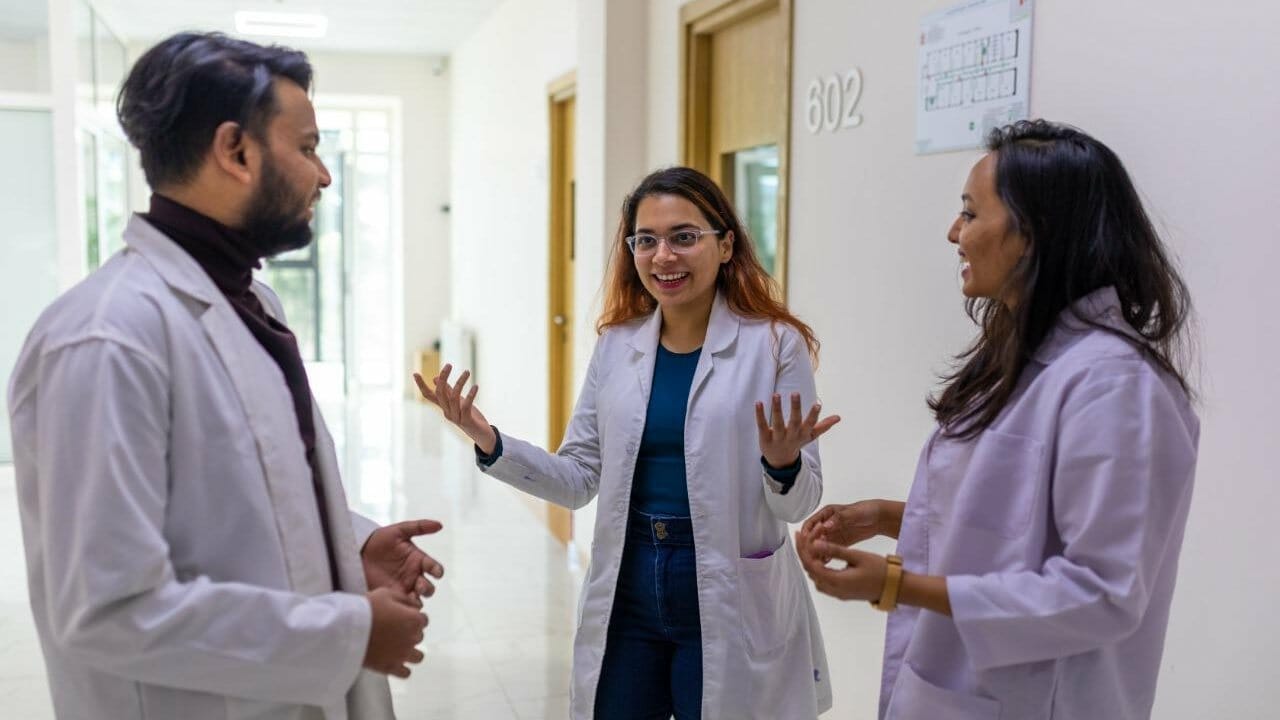How To Transfer Between Medical Schools

Many medical students seek to transfer between medical schools in order to complete their education elsewhere. While their reasons for moving may differ significantly, they ask mostly the same questions: how does that work? Is it possible to transfer to medical schools? What documents do I need, etc. This article provides answers to the most common questions about transferring between medical schools and how to do it. Moreover, it offers a comprehensive list of the best medical universities that offer transfers. It’ll be a resource that can immensely help you with transferring medical schools.
Key takeaways in this blog include:
- Students have the legal right to transfer medical schools and pursue a more suitable educational path abroad
- You can apply for a medical school transfer internationally as early as completing your 1st year of study
- Europe offers the largest list of medical schools that accept transfer students
Table of Contents
- 1 Is It Possible to Transfer Between Medical Schools?
- 2 Can You Transfer Between Medical Schools?
- 3 Do I Have to Repeat Any Semesters?
- 4 How to Transfer Medical Schools
- 5 GMC Transfer Rules for UK Practice
- 6 Our Webinar Awaits You
- 7 List of Medical Schools that Accept International Transfer Students
- 8 Apply for a Transfer with Medlink Students
- 9 Why We Care
- 10 FAQ
- 10.1 Is it Possible to Transfer Medical Schools?
- 10.2 What is The Essential 1st Step When Considering How to Transfer Medical Schools?
- 10.3 As a Medical School Transfer International Student, Do I Have to Repeat Any Classes?
- 10.4 What are Some Medical Schools That Accept Transfer Students UK?
- 10.5 Can you Transfer Medical Schools During Your 2nd Year?
Is It Possible to Transfer Between Medical Schools?
Can I transfer to medical school? This is a question that is likely to pop up during your studies, and luckily, it has a very short answer: yes. Medical students have the legal right to transfer from one university to another. Moreover, their current university has an obligation to provide a transcript and letter of evaluation to another institution upon the student’s request.
However, not all universities accept transfer students, which is why students often search for a list of medical schools that accept transfer students in Europe. In addition, schools in the UK do not accept students who have transferred to foreign countries. At the same time, US universities are less likely to recognise credits (classes) from non-US schools. European universities remain most advantageous in this regard since their requirements are relatively liberal.
Last but not least, students can transfer only to the same programme; they cannot transfer from dentistry to medicine, for example. Thus, aspiring doctors have a limited range of viable options when moving from one school to another.
Can You Transfer Between Medical Schools?
These are the rules of thumb that will help you figure out whether you can transfer to a medical school or not:
● At least 1 year of studies is required to apply as a transfer student.
● Universities usually accept transfers at the beginning of an academic year, though some schools are exceptions to the rule.
● Transfer requests are considered only if there are available seats at the university.
● Some universities have minimum grade requirements for transcripts.
● Universities that accept transfers in Europe are more likely to accept a transfer than those in the UK and USA.
● Students should demonstrate a legitimate reason for their decision to change schools.
If you pass all of the above requirements, your application covers the basic requirements for a transfer to most schools.
Stuck in a university you don't like? Check if you are eligible to transfer today:
Check your email to Book a FREE call
with an expert advisor
Look at your promotions/spam folders, just in case.
Do I Have to Repeat Any Semesters?
Medical schools that accept transfers need to match the applicant's transcript to their own curriculums. Universities have differing curriculums, which is usually the case when they are in different countries. Thus, medical schools that allow transfers should ensure that students meet the requirements for successful graduation according to their curriculum and local legislation.
Therefore, aspiring doctors may have to take some extra courses not covered in their transfer transcripts. Usually, the more years they have studied, the more courses they will take. A student transferring after 1 year will have to cover fewer additional classes (if any) than a student moving after 4 years of studying.
Aspiring doctors usually take no more than a semester or two of additional courses. There is no going around this rule, and minor differences might exist between universities due to their unique curriculums.
How to Transfer Medical Schools
The process of medical university transfers is not that complicated, but simply doesn’t mean easy. Here is a step-by-step guide to transferring between medical schools:
-
Identify your motivation for transferring.
This is an essential step of the process because you don’t want to end up in the same situation that requires your transfer.
-
Select the right universities.
Not all medical schools that accept foreign transfers will be the right choices. It would help if you considered educational, financial, cultural, and other factors. Choose a few safe options to maximise your chances.
-
Consider the application deadlines.
Depending on the university, the application process may take 3 to 6 months. In addition, medical schools won’t accept transfers after they have filled their quota, so early birds get the transfers.
-
Request transcripts and other documents from your university.
Once you have selected medical schools, you need to prepare transcripts, evaluations, and recommendations as your target institutions require.
-
Submit your application.
Applying abroad as an international student is a laborious process that involves a lot of documentation and paperwork. Feel free to consult with experienced professionals if you need a hand.
-
Apply for a visa and make travel arrangements.
This is another part of the process that requires documentation and watching ink dry. The best student support agencies offer assistance in handling it.
-
Scout the new location and prepare accordingly.
Going to a new country is never easy, but you might have some experience in it by now. Research the place and use admission officials or agency contacts to prepare accordingly.
-
Register for classes and pay your tuition fees.
You’ve done it! One journey has ended, and another one begins. Enjoy the ride!
Reserve Your Spot for Our Webinar
The Safe Way to Transfer Medical Schools Without Losing Credits
GMC Transfer Rules for UK Practice
If you’re considering a university switch or if you’re already a medical school transfer, it's crucial to know how this affects your ability to practise medicine in the UK. To be able to go to the UK after graduation, you will need to register with the GMC, which is the authoritative body responsible for the medical register in the United Kingdom.
The GMC will recognise your new qualification under specific conditions:
- Your degree will be recognised if the transfer is to a medical school participating in a twin or dual-degree programme or if it's a branch campus of your initial university.
- Transfers must be for legitimate reasons, such as being unable to complete your studies at the original university rather than due to academic failure or dismissal.
- The credits contributing to your degree must not come from a non-medicine programme, like nursing or biomedicine. This means that you have to go through a complete course of medical education to qualify for GMC approval.
- Your credits must not be from a medical school that the GMC does not accept.
If your degree consists of credits from GMC-approved medical schools, then they will review your qualifications to ensure they meet the necessary standards for practice in the UK.
If you would like to read more on the criteria for GMC approval, you can read our informative blog: Overseas Medical Qualifications Recognised in the UK: GMC Approval Guide
Our Webinar Awaits You


Are you a medical student considering the possibility of transferring between universities in Europe or the Caribbean to continue your education elsewhere? You're not alone! Many students like you have various reasons for seeking a change, but they all share similar questions and concerns about the transfer process.
We are excited to invite you to our informative, free webinar that aims to address the most common queries, including "Do medical schools accept transfer students?" and which medical schools accept transfer students. Additionally, we will guide you through the necessary steps to make this transition seamless.
Reserve Your Spot for Our Webinar
List of Medical Schools that Accept International Transfer Students
The following universities rank according to a comprehensive rating system that considers educational, financial, cultural, and transfer factors. Here are the best medical schools that accept international transfer students:
- Petre Shotadze Tbilisi Medical Academy - Georgia
- European University In Tbilisi - Georgia
- Trakia University - Bulgaria
- Pavol Jozef Šafárik University - Slovakia
- University of Silesia - Poland
- Near East University - Cyprus
- Humanitas Medical University of Milan - Italy
- University Of Sofia St Kliment Ohridski - Bulgaria
- Sofia Medical University - Bulgaria
- Titu Maiorescu University - Romania
- University Targu Mures Medical Campus Hamburg - Germany
- University of Debrecen - Hungary
- Riga Stradins University - Latvia
- Acibadem University - Turkey
- University Of Novi Sad - Serbia
- Medical University of Bialystok - Poland
- Semmelweis Medical University of Budapest - Hungary
- Poznan University of Medical Studies - Poland
- Medical University of Lublin - Poland
- European University Cyprus - Cyprus
- University Of Warmia And Mazury In Olsztyn - Poland
- Wroclaw Medical University - Poland
- Charles University Third Faculty Of Medicine - Czech Republic
- Vilnius University - Lithuania
- University Of Medicine & Pharmacy Craiova - Romania
- Szeged University - Hungary
- University of Health Sciences School of Medicine in Antigua & Barbuda - The Caribbean
These are only a few that answer the “what medical schools accept transfer students” question. For a more comprehensive list, check out our 100+ Best Medical Schools In Europe Taught In English, or book a free consultation with us so we can match you with the university that fits your needs the best.
Apply for a Transfer with Medlink Students
Transferring med schools can be challenging for anyone who is not an expert. If you are tired and annoyed by all the paperwork, documentation, and application procedures, call us for a free WhatsАpp consultation.
You will get expert advice tailored to your needs and gain knowledge and insight from experienced student advisors. Feel free to schedule a free consultation at a convenient time for you.
Why We Care
Understanding that you have the option and right to transfer between medical schools can help you get into a better educational environment. Through transferring, you can find the perfect educational path that better suits your goals and can help you become a successful doctor or dentist. Here are the main factors that go into deciding whether transferring is the right decision for you:
Legal rights: You have the legal right to transfer, and your current university must provide the necessary documents.
Eligibility and requirements: Knowing the requirements for transferring is essential if you want to get accepted. The main prerequisites include completing at least 1 year of studies and meeting grade and course requirements.
Potential additional courses: Being aware that you might need to repeat some semesters or take additional courses due to curriculum differences can help you plan your academic journey accordingly.
GMC transfer rules: Understanding the specific conditions under which the General Medical Council (GMC) in the UK will recognise your transferred qualifications is vital if you want to become a doctor in the UK. Support and guidance: Remember that Medlink Students is always available to give you expert advice and assistance in the transfer process. We can answer any questions you may have, simplify the whole process, and make your transfer as smooth as possible.
FAQ
Is it Possible to Transfer Medical Schools?
Yes. Countries allow medical school transfer applications as long as you meet credit, course, grade, and documentation requirements.
What is The Essential 1st Step When Considering How to Transfer Medical Schools?
The essential first step in the process is to identify your motivation for transferring, as this is crucial to ensuring you’re choosing the right medical school for you.
As a Medical School Transfer International Student, Do I Have to Repeat Any Classes?
Due to curriculum differences, you may have to take some extra courses to match your new medical school's curriculum and graduation requirements.
What are Some Medical Schools That Accept Transfer Students UK?
The top medical schools that accept university transfers from the UK include Petre Shotadze Tbilisi Medical Academy, European University in Tbilisi, Trakia University, and the University of Silesia, among others.
Can you Transfer Medical Schools During Your 2nd Year?
Yes. Since the requirement is to complete at least 1 year of studies, you are eligible to apply for a transfer at the beginning of your 2nd academic year.
58 comments on “How To Transfer Between Medical Schools”
Leave a Reply to Muhammad Wahab Cancel reply


About Medlink Students
Leading international recruitment company for medical students in Europe. British Council Certified Agents. 10+ years of experience and more than 10,000 students advised.









Can you tell me some other universities?
Hey Adeel! Thanks for contacting us. There are a couple of options. To find the best one for your case, please submit an application here: https://www.medlinkstudents.com/apply/, and one of our advisors will call you. It's FREE and only takes 10 seconds to complete.
Is it possible to transfer to Spain?Iam a student in china and completed 6th semester
Hey Midhun! Thank you for contacting us. While it may be possible it is competitive and so presents a lot of risks. They also do not fully teach in English. If you want help with transferring, we can help you find an entirely English-taught transfer program, with affordable tuition fees, while also offering outstanding teaching.
If you want help knowing what transfer options are available to you, submit an enquiry for a FREE consultation here: https://www.medlinkstudents.com/apply/
Please is it possible to find med schools that accept transfer students in france?
Hey Ngome! Thank you for contacting us. Generally, students choose transfer options in countries that are not as competitive and teach in English. Did you know that less than 10% of medical students will be able to progress into the 2nd-year in French medical schools due to how few seats are available!
I need transfer for 2nd year. I was the student of Knmu in Ukraine . Now i completed my 1st year. Good kind of college fee around 4 lakh.
Hey Ashna! Thank you for contacting us. This is an excellent question that is best answered in person after considering your situation. You can do that for free here https://www.medlinkstudents.com/apply/. It takes only 10 seconds and one of our advisors will contact you as soon as possible.
Hello
I am study mbbs in 3rd year in kyrgyzstan now i want to transfer credit hours in germany or poland is it possible?
Hey Ambreen. We can help you transfer. One of our student advisors will gladly speak with you about your options. You can book a FREE consultation here: https://www.medlinkstudents.com/apply
Hello sir i completed my 1st year in Kazakhstan i get transfer to 2nd year in Schengen counties which country is best and cheap for me please sir guide me 🙏🙏
Hey Zain! Thank you for contacting us. This is an excellent question that is best answered in person after considering your situation. You can do that for free here https://www.medlinkstudents.com/apply/. It takes only 10 seconds and one of our advisors will contact you as soon as possible.
Hello I am studying my mbbs 1st year in ukraine can I get transfer to some eu countries that has fee like 4 lakhs
Hey Nafila! Thank you for contacting us. This is an excellent question that is best answered in person after considering your situation. You can do that for free here https://www.medlinkstudents.com/apply/. It takes only 10 seconds and one of our advisors will contact you as soon as possible.
Hello I'm studying 5th year in Ukraine can I get trnsfer to Germany or London and fee around like 4 lks
The UK do not accept any transfers from outside of the country, however you have many other options you can consider! We would need to look into you situation a bit more to determine where is best, feel free to give us a call!
Hi, I'm studying 1st year in Jan kochanowski university "medicine", in Poland. Can I get transfer from Polish university to Latvian university? For example transfer from Jan kochanowski university into University of Latvia or Riga standrig university?
Hey! Thank you for contacting us. This is an excellent question that is best answered in person after considering your situation. You can do that for free here https://www.medlinkstudents.com/apply/. It takes only 10 seconds, and one of our advisors will contact you as soon as possible.
dear madam/sir
medilink students
how long it takes for acceptance letter OF MEDICIAN STUDENTs TRANSFER OF UKRAIN DNIPRO MEDICAL ISTITUTE STUDENTS TRANSFER FOR 5TH YEAR IN SERBIA from education ministry SERBIA
Hey! Thank you for contacting us. This is an excellent question that is best answered in person after considering your situation. You can do that for free here https://www.medlinkstudents.com/apply/. It takes only 10 seconds, and one of our advisors will contact you as soon as possible.
Hello,
Would it be possible to transfer after completing 1 year of medicine in Poland (public college) to Portugal (public college) in case job of my husband is the reason?
Hey! Thank you for contacting us. This is an excellent question that is best answered in person after considering your situation. You can do that for free here https://www.medlinkstudents.com/apply/. It takes only 10 seconds, and one of our advisors will contact you as soon as possible.
hi! can i transfer medical schools from hungary to the UAE?
Hey! Thank you for contacting us. This is an excellent question that is best answered in person after considering your situation. You can do that for free here https://www.medlinkstudents.com/apply/. It takes only 10 seconds, and one of our advisors will contact you as soon as possible.
Hi it's possible to transfer 2snd year complete MBBS in from Kyrgyzstan .To UK USA. Hungary. Germany. Australia
Hey! Thank you for contacting us. This is an excellent question that is best answered in person after considering your situation. You can do that for free here https://www.medlinkstudents.com/apply/. It takes only 10 seconds, and one of our advisors will contact you as soon as possible.
Hey I am currently a second year medical student in Romania, would I be able to transfer from Romania to a Polish Medical school specifically Nicolaus Copernicus University
Hey! Thank you for contacting us. Learn about your options to transfer into another medical school from our expert advisors. This is an excellent question that is best answered in person after considering your situation. You can do that for free here https://www.medlinkstudents.com/apply/. It takes only 10 seconds, and one of our advisors will contact you as soon as possible.
Hi. Can I transfer from South Africa 3rd year medicine to Germany. I need a school that has an english-speaking programme.
Hey! Thank you for contacting us. We have expert advisors that can assist you in continuing your medical education in Europe. This is an excellent question that is best answered in person after considering your situation. You can do that for free here https://www.medlinkstudents.com/apply/. It takes only 10 seconds, and one of our advisors will contact you as soon as possible.
Good day,
I have a simple question for you.
Can you tell me if it is possible to transfer from the Medical Faculty of the University of Belgrade to the Medical Faculty of the University of Oslo or another university in Norway after completing the first year and having completed 60 ESPB, i.e. passing all exams. What are the odds? Also, if it's not possible or it's a bit more likely for Norway, can you tell me if it's possible to transfer to Denmark or Sweden?
Best Regards!
Aleksa Zivkovic
Hey! Thank you for contacting us. We have the best answers for your query from our expert advisors. This excellent question is best answered in person after considering your situation. You can do that for free here https://www.medlinkstudents.com/apply/. It takes only 10 seconds, and one of our advisors will contact you as soon as possible.
will you kindly help me if I can transfare my failed 5th medical school to any international medical university.
many thanks
Hey! Thank you for contacting us. Our expert advisors can surely help with this question. It is best answered in person after considering your situation. You can do that for free here https://www.medlinkstudents.com/apply/. It takes only 10 seconds, and one of our advisors will contact you as soon as possible.
Hey! Thank you for contacting us. We are here to help. Our expert advisors can provide you with answers for your query. This is an excellent question that is best answered in person after considering your situation. You can do that for free here https://www.medlinkstudents.com/apply/. It takes only 10 seconds, and one of our advisors will contact you as soon as possible.
I finished the first year of medicine I will finish the second year of medicine in Russia and I want to know is there a possibility to transfer from the second year to the third year in your faculty
Hey! Thank you for contacting us. This is an excellent question that is best answered in person by one of our expert advisors. You can submit an application for free here https://www.medlinkstudents.com/apply/. It only takes 10 seconds, and one of our advisors will contact you as soon as possible.
Is it possible to get transfered in the 2nd tear from the medical school of nicosia (unic) in Cyprus to a public medical school in Italy (English taught) after having completed successfully the 1st year in Cyprus?
Hey! Thank you for contacting us. This is an excellent question that is best answered in person by one of our expert advisors. You can submit an application for free here https://www.medlinkstudents.com/apply/. It only takes 10 seconds, and one of our advisors will contact you as soon as possible.
Hi!
I really appreciate your efforts. Keep sharing such informative stuff. Really amazing. Thank you.
I am a second year medical student in china and I want to transfer to German medical university. I have also learned German language.
Hey! Thank you for contacting us. This is an excellent question that is best answered in person by one of our expert advisors. You can submit an application for free here https://www.medlinkstudents.com/apply/. It only takes 10 seconds, and one of our advisors will contact you as soon as possible.
Hi there
I am going to do the 4 th semester in my country, Brasil. I am looking to get into any Irish collage. Trinity has better value so far as a residence visa holder.
I just moved back home to study and other personal thing.
Obviously my first option is Ireland but I can do collages in Portugal, Spain or any European collage that can speak English.
Ps; I have health degree recognised in Ireland too, If it helps.
Thanks a million
Hi there
I am at 4th semester in a collage I’m Brazil. Looking to transfer my collage to Ireland.
If not, I am open to transfer to any collage that can speak English, Spanish or English.
Is it possible to transfer to Ireland?
Thanks a million
Hey! Thank you for contacting us. This is an excellent question that is best answered in person by one of our expert advisors. You can submit an application for free here https://www.medlinkstudents.com/apply/. It only takes 10 seconds, and one of our advisors will contact you as soon as possible.
hey
i was wondering if I can transfer to any of the universities above in Poland if I had done all my schooling in French (I am a third year medical student who completed all my years) do they accept students who have studied in French or not and that are not from the EU
thank you
Hey! Thank you for contacting us. This is an excellent question that is best answered in person by one of our expert advisors. You can submit an application for free here https://www.medlinkstudents.com/apply/. It only takes 10 seconds, and one of our advisors will contact you as soon as possible.
Hello , good day
Actually I’m medical student of 4th course in Russia
And I’m very interested about European universities so I want to know which universities can I apply to transfer?
Hey! Thank you for contacting us. This is an excellent question that is best answered in person by one of our expert advisors. You can submit an application for free here https://www.medlinkstudents.com/apply/. It takes only 10 seconds, and one of our advisors will contact you as soon as possible.
Dear Medlink Students.
Is it possible to transfer after 7th or 8th semester from Pécs Medical University to Italy or Denmark?
Hey! Thank you for contacting us. This is an excellent question that is best answered in person by one of our expert advisors. You can submit an application for free here https://www.medlinkstudents.com/apply/. It only takes 10 seconds, and one of our advisors will contact you as soon as possible.
Hi, My name is Muhammad Abdullah, Recently I have completed my 3rd year (MBBS) from Astana Medical University, Kazakhstan, and now I want to transfer to Europeans countries which will accept transfers. Any suggestions
Hey! Thank you for contacting us. This is an excellent question that is best answered in person by one of our expert advisors. You can submit an application for free here https://www.medlinkstudents.com/apply/. It only takes 10 seconds, and one of our advisors will contact you as soon as possible.
Hlo I am first year medical student in Kyrgyzstan I want to transfer in Italy can you provide more information
Hey! Thank you for contacting us. To get the best answer to your question taking into account your specific needs and requirements, please submit an application here: https://www.medlinkstudents.com/apply/, and one of our advisors will call you.
Hi!
I am third year medical student in University of Health and science Lahore Pakistan
Now immigrated to United States of America
so how can I transfer from that University to any Medical university in America.
studying 2nd year medicine in Poland . How can u get transfer to other European medical university
Hello, I am a second year medical student in Sofia Bulgaria. Is it possible to transfer for my third year and beyond to a medical university in the uk?